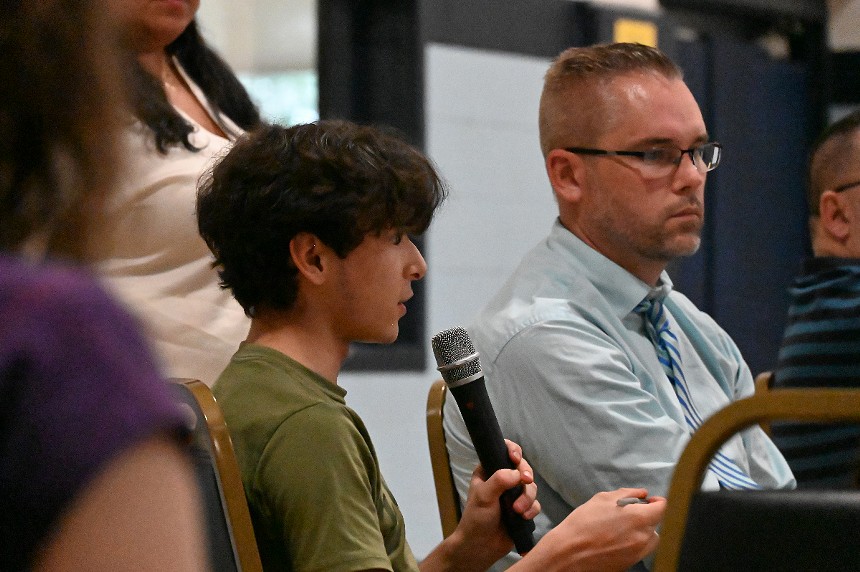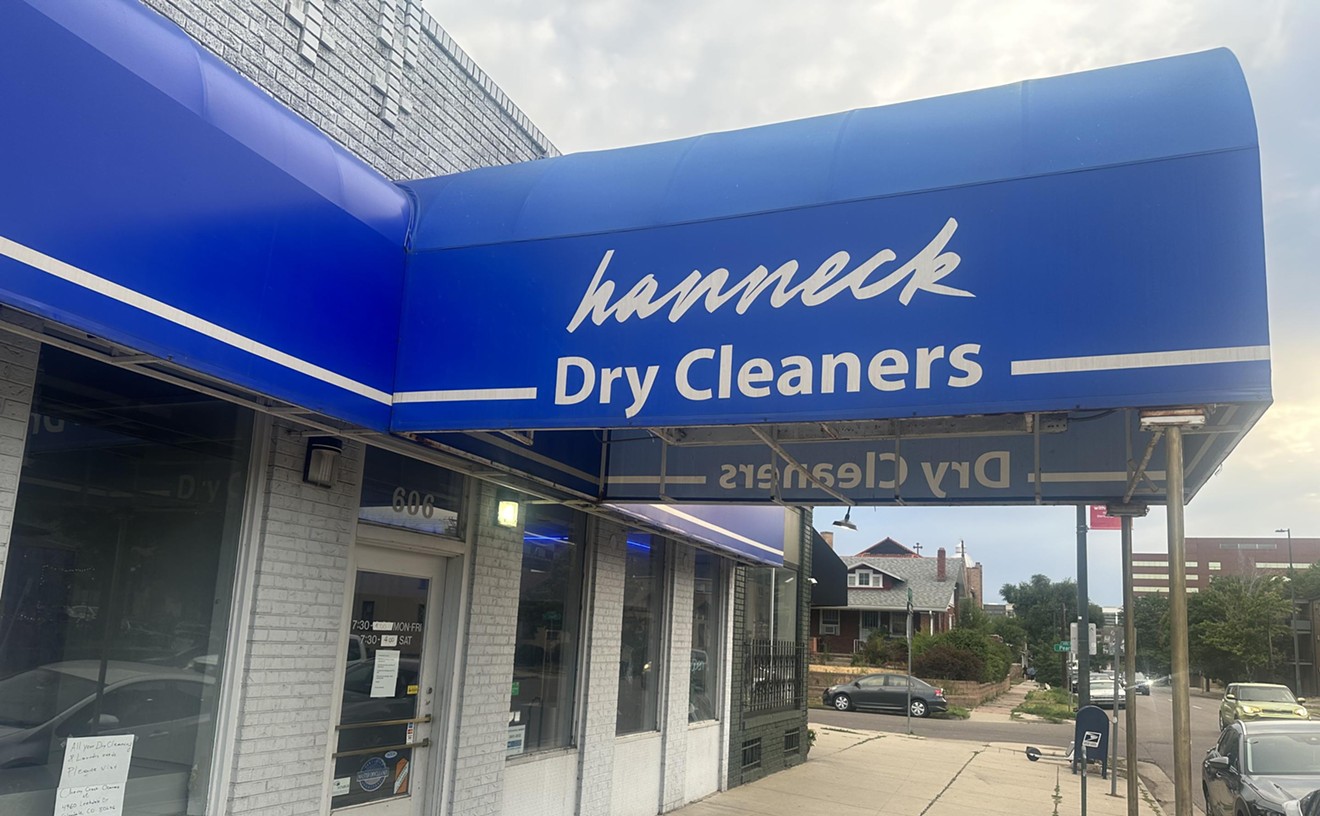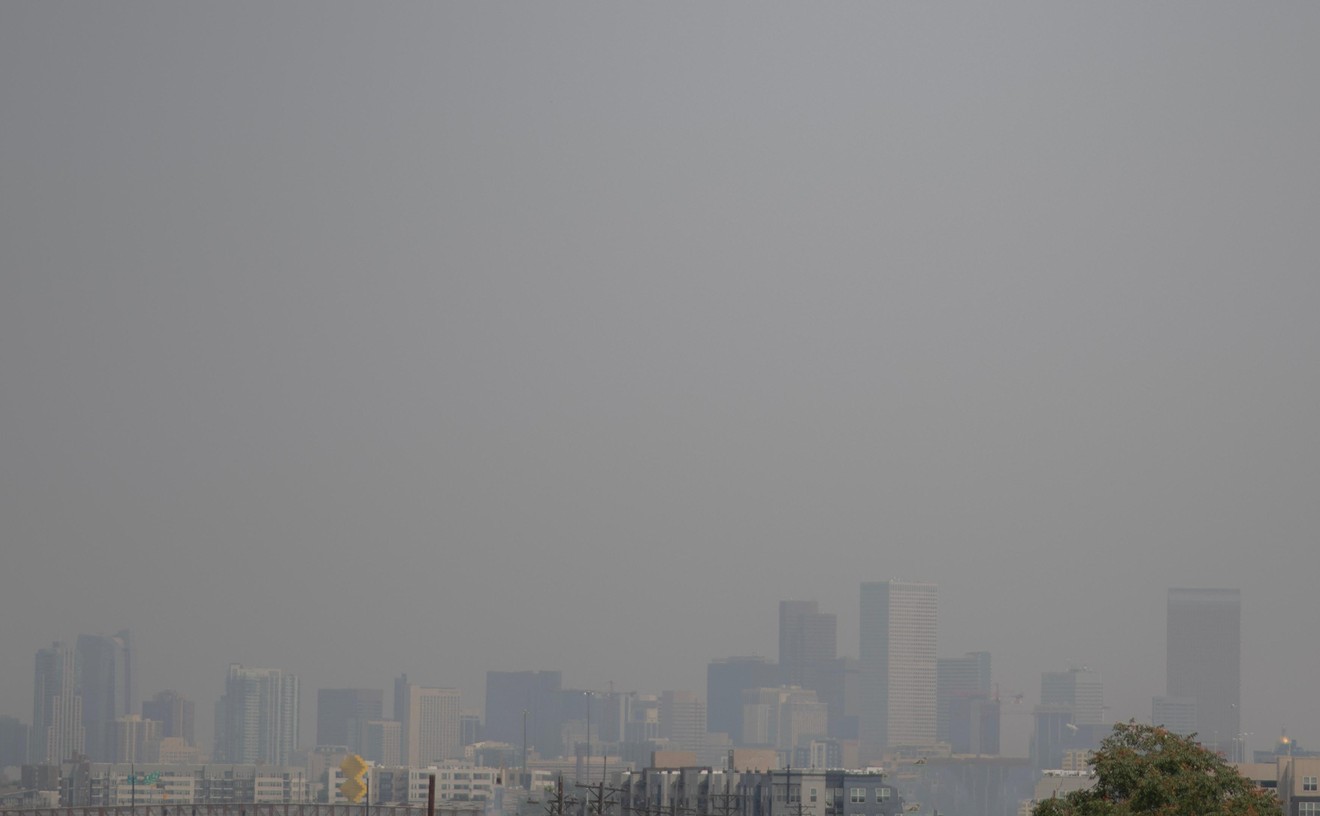The "Affordable Denver" half-cent sales tax would raise $100 million a year for the city to build and preserve 44,000 cost-controlled units, with upwards of 5,000 coming in 2025. Johnston revealed the idea on July 18 and has been campaigning for it since, but city councilmembers want to know more before approving it for the November election ballot.
According to Johnston, the added sales tax passes would cost the average family $2 a week if it passes. During a town hall about Denver affordability at Harvey Park Recreational Center on Wednesday, July 24, Johnston said he would prioritize buying already built units ahead of constructing new ones.
"The sales tax does not apply to groceries, so it's not going to be something you pay when you go to the grocery store," he said. "It does not apply to gas. It does not apply to medicine or medical supplies or hygiene products. There are a lot of things that are exempted."
About 35 percent of Denver's existing sales taxes are paid by non-Denver residents, he added. "But, importantly, that $2 a week is what helps these folks that are in these units, these working families, to drop their rent each month by $500 to $800. That's a huge win-win," he told a crowd of about thirty residents.
Housing that Denver builds with the Affordable Denver tax revenue would be deed-restricted, Johnston said. The city would use the new funds to help nonprofits invest in developing affordable housing, but only if they agree to keep the rent for those units at less than 30 percent of each renter's monthly income.
"If a unit costs $400,000 to build, we're not going to spend $400,000 of taxpayer's money. We might spend $50,000, the developer springs $350,000, and we help close that gap," Johnston said. "And that gap allows us to then say, 'This unit will be deed restricted to always be affordable.'"
Potential units include "a rental unit. It could be a home, it could be a single-family home, it could be a duplex, it could be any rental or ownership unit in the city," the mayor said.
According to the mayor's office, 50 percent of renters in Denver are paying more than 30 percent of their monthly income on rent, which makes them cost-burdened by federal standards. The median income in Denver doubled from 2000 to 2022 from $40,000 to $84,000 — but the median home price more than tripled during the span, from $165,500 to $525,000. Meanwhile, the median Denver rent nearly tripled, from $630 to $1,870.
Johnston also mentioned that a recent Pulse poll showed that nearly 90 percent of Colorado residents reported the cost of housing as a significant concern, including residents of Harvey Park.
Housing Affordability in Southwest Denver
District 2 City Councilman Kevin Flynn, who represents southwest Denver, calls Harvey Park "one of the most affordable parts of Denver." But during the July 24 town hall, several people living in the neighborhood complained of rising housing costs. One resident noted that many families in Harvey Park and other west Denver neighborhoods have been living there for multiple generations. In the 1980s, she remembered said grandmother's rent was $59 a month in Harvey Park.
"My grandmother came here as a displaced Aurarian, and she knew what it was like to be pushed out of her neighborhood," the resident recalled. "It's clear that we're getting etched out of Harvey Park. Each generation, the rent goes up, and now we're at the point where we're seeing our children have to leave their roots and their family behind."
During the meeting, Harvey Park homeowner Allyson Rogers told Jamie Rife, the executive director of Housing Stability, that she felt "lucky and privileged that I bought my house when I did, and at the time, I thought it was really expensive.
"If I had to buy my house today, I wouldn't be able to afford it," Rogers said. "I feel bad for people younger than me, because I don't know how they're going to buy a house now."
Fellow Harvey Park resident Timi Durojaiye told Rife, "My rent increases every year, and I've been living in the same place, the same apartment, for four years. It would be nice if, at the beginning of every lease, you could see how much rent has increased or will increase. It would be nice to see that before I sign my lease."
During the meeting, Johnston noted that city council is considering a citywide rezoning that would streamline the permitting process to build Accessory Dwelling Units (ADUs), small units built as extensions to existing homes, usually in backyards.
According to Johnston, ADUs offer a way to add rooms for family members or roommates to move in without additional costs besides construction. The city would offer a catalog of seven models of ADUs for residents to choose from and "to simplify" the process, he said.
"Almost like an old Sears catalog, you just have seven different ADUs that are pre-approved," he explained. "You can just pick one, and instead of getting your own architect, design your own thing from scratch, you just say, 'I want number three,' and then the city and council already know...that ADU is pre-approved if it fits in your yard."
The council last looked at the ADU rezoning in March, but the bill hasn't moved since then. Flynn and Johnston reassured residents that the council will pick the item up again soon, however.
"My grandmother came here as a displaced Aurarian, and she knew what it was like to be pushed out of her neighborhood," the resident recalled. "It's clear that we're getting etched out of Harvey Park. Each generation, the rent goes up, and now we're at the point where we're seeing our children have to leave their roots and their family behind."
During the meeting, Harvey Park homeowner Allyson Rogers told Jamie Rife, the executive director of Housing Stability, that she felt "lucky and privileged that I bought my house when I did, and at the time, I thought it was really expensive.
"If I had to buy my house today, I wouldn't be able to afford it," Rogers said. "I feel bad for people younger than me, because I don't know how they're going to buy a house now."
Fellow Harvey Park resident Timi Durojaiye told Rife, "My rent increases every year, and I've been living in the same place, the same apartment, for four years. It would be nice if, at the beginning of every lease, you could see how much rent has increased or will increase. It would be nice to see that before I sign my lease."
During the meeting, Johnston noted that city council is considering a citywide rezoning that would streamline the permitting process to build Accessory Dwelling Units (ADUs), small units built as extensions to existing homes, usually in backyards.
According to Johnston, ADUs offer a way to add rooms for family members or roommates to move in without additional costs besides construction. The city would offer a catalog of seven models of ADUs for residents to choose from and "to simplify" the process, he said.
The council last looked at the ADU rezoning in March, but the bill hasn't moved since then. Flynn and Johnston reassured residents that the council will pick the item up again soon, however.
City Council Holdup
Hours before Johnston's meeting at Harvey Park, the City Council Safety & Housing Committee voted to delay an early vote on whether to send the Affordable Denver tax to the ballot. Councilmembers said they needed more information from Johnston's office before making a decision."If we're asking voters to approve something in the range of $100 million a year, we should be able to tell them at the time what they are voting for and what they are voting to do,” Councilwoman Jamie Torres said during the committee meeting. "We have to be very clear about who we're building affordable housing for."
Torres wants to see a commitment in the ballot language to building affordable housing for families making less than 60 percent of the area's median income, which is less than $78,000 a year for a family of four. According to Torres, families in that category represent the "urgency in permanent housing."

16-year-old Camilo Ayadi asked Johnston if he plans to allow developers to build more housing as a way of lowering rents during a Community Conversation at the Harvey Park Recreation Center on Wednesday, July 24.
Bennito L. Kelty
The committee delayed the vote on Affordable Denver by two weeks and will reconsider it on August 7. Johnston had been hoping that by August 12 the proposal would have been past the two readings needed to get on the ballot. Now, the earliest the first reading and public hearing can take place with the full council is August 19, giving the proposal a small margin of error to pass in time to land on the November 5 ballot.
Johnston also clarified at the Harvey Park meeting that the Affordable Denver sales tax will not benefit his homelessness plans.
The town hall was part of Johnston's Community Conversations, a series of public meetings launched in April as part of the mayor's Citywide Goals 2024. After a citywide series on safety in June, Johnston is currently visiting residents in each City Council District, asking them how to make Denver more affordable, vibrant and better governed.
Although the series on affordability is ongoing, the series on vibrancy will start next week in City Council District 10, represented by Councilman Chris Hinds.












